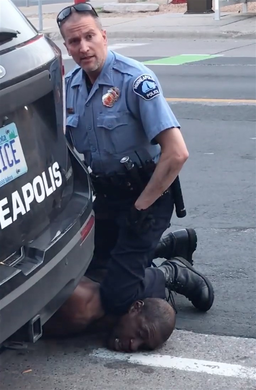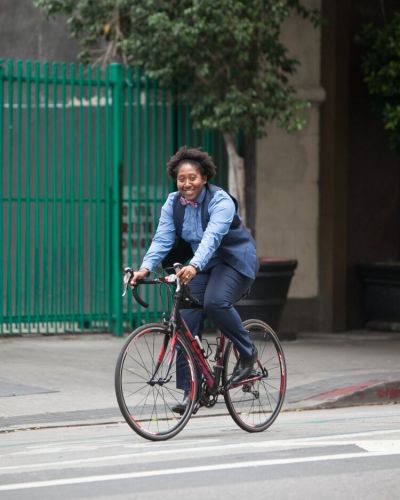Cycling News & Blog Articles
'Just shut up and bike' is not the solution, Black cyclist tells industry
BOULDER, Colo. (BRAIN) — Tamika Butler gave fair warning early to the 300-plus attendees of her Virtual Bicycle Leadership Conference address Wednesday morning.
"If you are timid about hearing about blackness and about hearing about race, this probably wasn't the morning session for you," said Butler, an avid cyclist and former executive director of the Los Angeles County Bicycle Coalition.
Indeed, Butler, the principal and founder of Tamika L. Butler Consulting, offered frank opinions about racial inequity despite what she frequently hears in rebuttal.
Just shut up and bike.
"You see folks in businesses, saying that Black women are just too emotional," Butler said during her 30-minute speech on The Role of Bikes in Mobility Justice during the conference presented by PeopleForBikes. "And in the bike world, I think there are a lot of Black folks who have heard just shut up and bike. Whenever I write something about bikes, the number of white folks who take the time to send me emails on social media that biking has nothing to do with race ... And that I should just shut up and focus on biking."
Butler, a graduate of Stanford Law School, was a civil rights employment lawyer. She said she grew out of love with the law and desired to work with nonprofits. Her chance to combine passion with profession came after she completed an AIDS/Lifecycle bike ride from San Francisco to Los Angeles. That's when she was told about the executive director opening at the L.A. County Bicycle Coalition.
She didn’t think it was a fit.
"Then I had another friend, a woman of color, who came back to me and said you have to apply for this job," Butler said. "Bikes and transportation are the baseline for which we have to see other social justice issues. And we're talking about how to get to their educational opportunities. How people get to the doctor. When people are able to have economic mobility. It's all about how they get there. And we have to have folks who are doing this work who are working at bike coalitions. Who are thinking about social justice. Who are thinking about what it would mean to be a bicycle organization that was anti-racist. We need more folks like you doing this work.
"Guilt works on me, so I decided to apply."
Butler said she was surprised to be offered the job, especially after telling the white board members, "I'm a queer Black woman. And that is the lens through which I see all my work. If you don't want this to be racial justice organization, then don't hire me."
But she did get the job in 2014 and said her nearly three-year tenure was embraced by a supportive board and staff.
"I have never watched this video of George Floyd dying. Because I can't handle that trauma. But I've seen this (photo). And I've seen that green bike lane behind him. So folks might want us to shut up and bike. No infrastructure is going to save our life when we are gasping for our last breath."
"It's still the best job I ever had," she said. "When you get to be on your bike everyday, and it's work, how can you do anything but smile? We were really impacting change."
Progress made
During her time, bike share was launched in L.A. and a ballot initiative was passed giving additional money to transportation, specifically to biking and walking infrastructure. "I was riding my bike to the Emmys. I got to do it all because of the doors bikes opened up for me."
But there was a headwind on the horizon.
A city council candidate, Joe Bray-Ali, who was then a bike shop owner, was running in 2017 with the promise of making cycling safer. A month before the runoff, it was reported he previously had made derogatory comments on a Reddit-like website targeting Blacks in addition to transgender, mentally disabled, and overweight people. Bray-Ali later deleted the comments and apologized.
"This was a person who opened up an expensive rare bike shop, and bike folks loved him," Butler said. "Bike folks loved the fact that he was going to make biking safer in this part of town. And not just any part of town, but the town I live in. This would've been my council member. When it came out, folks in the bike community came out and said that might be bad, but he's going to get me a bike lane."
Bray-Ali lost the runoff but the wound was deep.
"The point is, it's always easy to point at other people and say, 'I can't believe he didn't speak up and do something,'" Butler said. "But for many folks in this bicycling community, every single day you see and know people who are doing and saying things that you might say are a little off. But because you aren't a person of color, because you might not be fat, you might not be disabled, you might not be trans, because you might not be, you will let it go. And you don't speak up. And what you care about is, is this the coolest equipment? Is this the coolest bike? Is this going to get me a bike lane?"
Regarding infrastructure, Butler made note of the bike lane in the background of the widely published photo of Minneapolis Police Officer Derek Chauvin kneeling on George Floyd's neck.
 "I have never watched this video of George Floyd dying," she said. "Because I can't handle that trauma. But I've seen this (photo). And I've seen that green bike lane behind him. So folks might want us to shut up and bike. No infrastructure is going to save our life when we are gasping for our last breath."
"I have never watched this video of George Floyd dying," she said. "Because I can't handle that trauma. But I've seen this (photo). And I've seen that green bike lane behind him. So folks might want us to shut up and bike. No infrastructure is going to save our life when we are gasping for our last breath."
Butler urges the bike industry to be willing to risk backlash to stand against injustice.
Too many "wait for those of us who are folks of color to actually do something about it, to take a stand, to denounce it," she said. "Or in my case, to lead the organization. When you have top donors of your organization, when you have staff members, when you have board members saying you have to publicly endorse this person because this is our best shot at a more likable Los Angeles, that's when you have to take a stand.
"And for all of those people who don't speak up, part of it is because you don't want to lose anything. But for those of us who do speak up, you don't know about the endorsements we lose out on. You don't know about the jobs we lose. You don't know what it's like to ride your bike home from work crying and wondering how you're going to provide for your family. And you don't know what it's like to know since you left, the organization refuses to hire women of color because they just might not want to talk about race stuff."
Always speak the truth
Harkening to professional athletes speaking out about systemic racism who are told to shut up and play, Butler will continue to address the issues that might make some uncomfortable.
"So, when you say shut up and bike because bikes don't discriminate, you're absolutely right. Bikes don't discriminate. But cyclists are people, and frankly, the fastest growing number of people who bike are folks of color. But the folks we see in our magazines, the folks we see on TV, the folks we see representing the community, leading the organizations, leading the companies on the boards and in the boardroom, those folks don't look like me. So, yeah, bikes might not discriminate, but people involved in bikes do."


